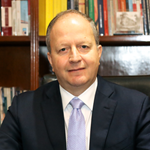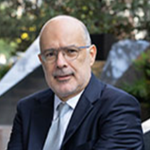|
Location: Cedar Hall, HQ1-1-660
![]() Click here for the photos
Click here for the photos
OVERVIEW
Paraguay is a landlocked middle-income country close to reaching investment grade after two decades of strong economic policies that have allowed it to weather increasingly frequent and intense climate shocks. This transformation started under Fund-supported programs following its last economic crisis in 2002-03. The issuance of local currency bonds in international markets for the first time in 2024 is a milestone that recognizes Paraguay’s macroeconomic record. On top of showcasing the country’s macroeconomic achievements, this event will discuss Paraguay’s agenda going forward, which is to become a predictable, profitable, and green investment destination leveraging on its natural resources and fully renewable electricity matrix and the support of a recently approved RSF.
REPORT
Key Points
Path towards investment grade. Since 2002, when Paraguay was considered a crisis country, there has been generalized support in the Paraguayan society for sound macroeconomic policies. Macroeconomic stability is highly valued in the country. So much so, that missing the 4 per cent inflation target by 0.2 per cent was cause for numerous headlines in the papers. This societal mindset, combined with a clear medium-term vision by policymakers and help by the IMF, was key for Paraguay’s journey.
Green Paraguay. Nearing investment grade, Paraguay now wants to focus on the future; a future where the sustainability of the economy is key. The Itaipú hydroelectric dam, providing clean energy, is testament to that ambition, as well as the recent efforts in becoming a hub for biofuels, green fertilizers, and green hydrogen. RSF support is crucial to support this transition and seen as a seal of approval by the IMF.
Quotes
"If there is no support in society, it is not possible to sustain reforms, to sustain sound macroeconomic policies, for a long period of time.” Carlos Fernández Valdovinos
“The green Paraguay is the one we are focused on at this moment and for that having the seal from the IMF with a program is going to be crucial.” Carlos Fernández Valdovinos
Blurb
After two decades of strong policies, Paraguay is close to reaching investment grade. With the support of the recently approved Resilience and Sustainability Facility (RSF), Carlos Fernández Valdovinos sets out the path for Paraguay to become a green investment destination.
Contributor: Sebastien Vanhoucke
SPEAKER

Carlos Fernández Valdovinos
Minister of Economy and Finance, Paraguay
Fernández Valdovinos es un reconocido economista a nivel nacional e internacional. Posee un Doctorado en Economía por la Universidad de Chicago, un Masterado en Política Económica por la Universidad de Illinois en Urbana-Champaign y tiene el grado de economista por la Universidad Federal de Paraná de Brasil. En el ámbito profesional, cuenta con una vasta experiencia en la implementación de políticas públicas. Se desempeñó como Gerente de Estudios Económicos del Banco Central del Paraguay (2001-2004). Ocupó el cargo de Economista Sénior para Argentina en el Banco Mundial (2004-2006) en Washington, DC. En 2006, ingresó al Fondo Monetario Internacional como Economista Senior para misiones a los países de los departamentos de África, Europa y del Hemisferio Occidental. Desde el 2011 desempeñó como Representante Residente del FMI para Brasil y Bolivia. En octubre del 2013 fue designado como presidente del BCP por un periodo de 5 años.
En el año 2023 fue designado Ministro de Economía y Finanzas para el período 2023-2028. En los años 2015, 2016 y 2017, ha sido galardonado como Banquero Central del año por la revista financiera internacional “Global Finance”. En el 2017, la revista internacional The Banker (Financial Times Group) lo ha premiado como Mejor Banquero Central de América y Mejor Gobernador, convirtiéndose así en el primer Gobernador Latinoamericano en recibir este premio.
Trabajó como docente de grado y posgrado en: la Universidad Nacional de Asunción (UNA), Universidad Católica Nuestra Señora de la Asunción (UCA). También en la Universidad de San Andrés en Argentina, y en la Universidad de Georgetown. Actualmente se encuentra enseñando en el programa de Maestrías de Políticas Públicas en la Universidad de Chicago, Estados Unidos. Tiene en su haber numerosas investigaciones y publicaciones en revistas académicas nacionales e internacionales.
MODERATOR

Rodrigo Valdés
Director of the Western Hemisphere Department
IMF
Rodrigo Valdés is a Chilean economist and has been the Director of the Western Hemisphere Department at the IMF since May 2023. Prior to joining the Fund, he served as a Professor of Economics at the Catholic University of Chile and held board positions in various private sector companies. Previously, he served as Chile's Minister of Finance from 2015 to 2017. Throughout his career, Mr. Valdés has held prominent roles at the Ministry of Finance and the Central Bank, including Director of Research and Chief Economist. Additionally, he has served as Deputy Director of the IMF’s Western Hemisphere Department (where he also was mission chief for the US) and European Department. Mr. Valdés has significant experience in the banking sector, having been the President of the Board and Executive Committee at Banco Estado, Chile’s sole state-owned bank. He has also worked as Director and Chief Economist for Latin America at Barclays Capital and as Chief Economist (Latin America ex-Brazil) at investment bank BTG Pactual. Mr. Valdés earned a PhD in Economics from MIT and a BA in Economics from the University of Chile. His contributions extend to publishing numerous academic and policy papers on monetary and fiscal policies, as well as on international finance.